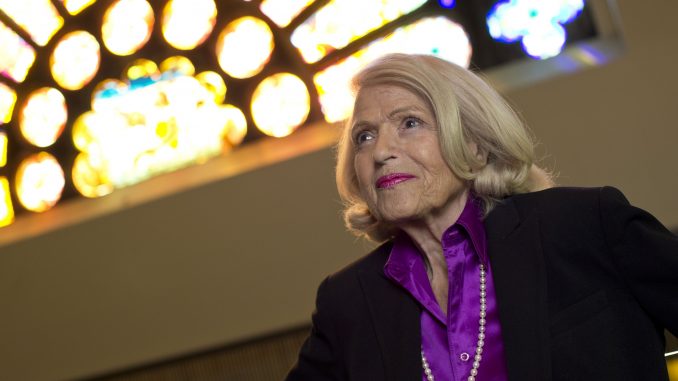
Angela Giampolo keeps an old box of Splenda sitting on her mantle.
For her, it’s a memento of the woman who helped make same-sex marriage legal.
“If it weren’t for Edie Windsor, I may not be in the position I am in, planning a wedding right now,” said Giampolo, a 2007 law alumna whose firm — Giampolo Law Group — focuses on LGBTQ issues.
In 2014, Giampolo was asked to interview Windsor, who graduated from the College of Liberal Arts in 1950.
The day they met, Windsor gave Giampolo the unwanted case of Splenda after insisting on using Equal to sweeten her coffee.
“She loved Equal, even though I told her no one knows what Equal is made of,” Giampolo said. “And she was like, ‘I don’t care. … I’m 85, if this is what kills me, this is what kills me, but I’m not not using Equal.’”
It’s one of many memories that surface for her when she thinks of Windsor.
“I’ll never forget the stories and experiences that we shared, and the advice that she’s given,” Giampolo said.
Last Tuesday, Windsor died at the age of 88. In 2013, Windsor toppled the Defense of Marriage Act, a law that refused to recognize same-sex marriage on the federal level.
“It is so sad to not have her anymore,” said Malcolm Kenyatta, a 2012 communication alumnus.
Kenyatta works as a board member of the Liberty City LGBT Democratic Club and the senior coordinator at the Chamber of Commerce for Greater Philadelphia. As a Temple student, he introduced a bill to implement gender-neutral bathrooms.
There are more LGBTQ issues left to be solved, Kenyatta said, like violence against trans women of color. Still, Kenyatta said, Windsor’s actions held legacy and inspiration.
Years after graduating from Temple, Windsor met Thea Spyer. The two women became engaged — a status they would carry for more than 40 years before marrying in the early 2000s.
ANGELA GIAMPOLO
2007 LAW ALUMNA
Windsor spoke constantly of her longtime fiancee, Giampolo said.
“And it wasn’t always puppies and babies and roses. There were hard times. And they almost called it quits, and didn’t,” Giampolo said.
In 1977, Spyer was diagnosed with multiple sclerosis, a chronic disease of the central nervous system. By 2007, she was told she had one year left to live.
Windsor and Spyer married in Toronto in 2007, where they could legally marry and returned to New York to live. When Spyer died in 2009, Spyer left her estate to Windsor, who was not eligible for spousal benefits and found herself drowning in federal estate taxes.
Windsor owed more than $350,000 to the government — a debt that would not have existed if the federal government recognized same-sex marriage.
Exemption from federal estate taxes is one of the 1,138 federal benefits tied to the institution of marriage, Giampolo said.
“If Thea was Theo, I would not have had to pay that,” Windsor told NPR in 2013.
Windsor sued the government, and the case went to the Supreme Court.
“She didn’t necessarily want to take the case, she was scared,” Giampolo said. “She had admitted being scared.”
In June of 2013, Windsor v. U.S. overturned the Defense of Marriage Act.
Two years later, the Supreme Court declared same-sex marriage legal nationwide.
“We would have eventually got it, but [Windsor] started that snowball going,” Giampolo said.
A year after DOMA’s downfall, Giampolo was asked to conduct a Q&A with Windsor at the Liacouras Center. Giampolo knew of Windsor, but had never met her. She was hesitant at first, she said.
“You can’t just ask me to meet the woman on the day of, and just pretend we have an intimate connection,” Giampolo said. “I have my own awestruckness, like, I gotta get over.”
Weeks before the event, Giampolo stopped by Windsor’s home in New York City to review a list of questions.
The meeting was supposed to be brief. The day before, Windsor had broken her nose walking into a glass door. She could only talk for a few minutes, she told Giampolo.
“And then it turned into sort of a nine-hour marathon,” Giampolo said.
Windsor told her stories and gave marriage advice. Giampolo went through a bottle of wine. Windsor drank two pots of coffee. Giampolo stopped at a deli and cooked Windsor a pot of matzo ball soup.
Weeks later, they spoke at the Liacouras Center. As the event unfolded, Giampolo reached over and squeezed Windsor’s hand, she said.
“It ended up being an intimate fireside chat,” Giampolo said.
A wine and beer reception followed. The two snuck in a bottle of vodka for Windsor, who was allergic to wine.
“That was really the beginning of our friendship,” Giampolo said.
“She was a pitbull in a chihuahua’s body,” Giampolo said of Windsor, who stood at five feet tall. “Anyone can be an unlikely hero, just like she was.”


Be the first to comment